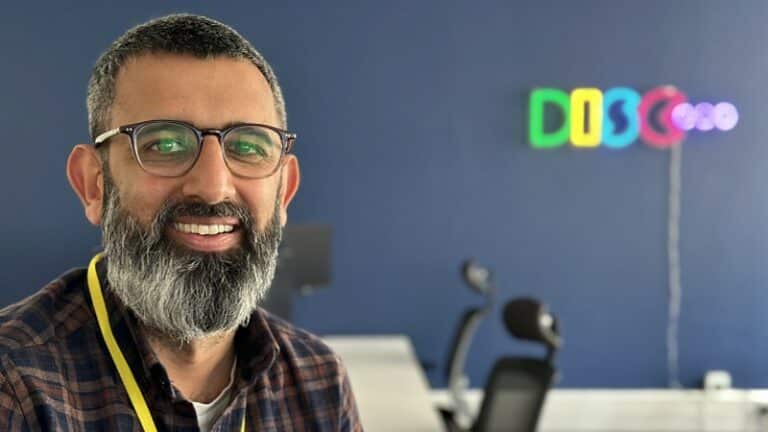Ravinderpal Gehlon is managing director at Digital Advantage.
Digital Advantage is a Manchester-based charity that supports young, disabled people to enter the digital and creative industries across the North West.
Gehlon kickstarted his career at charity called Groundwork East London, developing people’s employability skills but it was only when he moved to Manchester that he spotted a gap in the digital sector.
After finding there were very few opportunities for talented neurodiverse young people, he began to work with Digital Advantage CEO, Andy Lovatt, to bridge that gap. Here, he shares his career pathway, tips and advice.
How did you first get into your industry?
In 2006 I worked at a charity called Groundwork East London, developing people’s employability skills. I was based in a community centre, supporting the unemployed community and I loved it. Many of these individuals were lone parents or on income support and their confidence was low.
We helped them to write CVs and apply for jobs. A few years later I was seconded into a similar role at professional services firm Accenture. We found talented local people who were out of work and gave them employability training.
When I moved to Manchester in 2014, I wanted to use my experience in a different sector. I began working in schools with 14- 19-year-olds. Loads of these young people were amazing at graphic design and web development but many were autistic and there were very few opportunities for them when they left school or college. They struggled to apply for jobs and cope with interviews.
When I first met Andy Lovatt, CEO of Digital Advantage we discussed this issue. Digital Advantage were already working with students who had special educational needs and disabilities (SEND) in around 50 schools in Greater Manchester and the north-west. I came on board first as project manager and then as managing director and together, with the creative director, we developed a programme to help more of these young people to get their dream job in the creative and digital sector.
What do you love about your job?
I love being part of an organisation committed to improving diversity in digital. I’m a passionate believer in levelling up and the value that can offer society. Opening up job opportunities for young, neurodiverse people doesn’t just benefit them, it gives clients and agencies access to a new pool of talented individuals who think differently and have a wide range of specialist skills and strengths.
Who – or what – has inspired you in your career?
In my first proper job at Groundwork East London, I worked with a guy called Colin Zetie. He was head of the employment team and the passion and vigour he had was unparalleled. Colin was an interesting character; he’d worked in job centres previously and was a big advocate for social mobility and giving people opportunities in life. I learnt a lot from him.
What are the biggest challenges about your job?
The levelling up work that we’re doing at Digital Advantage hasn’t been done be fore and it can feel like an uphill battle. It’s particularly hard doing it in the digital and creative sectors where agencies and other organisations are often small, lean and disparate. They simply don’t have the resource to offer supported placements to young people with autism in the same way that large supermarkets, hospitals and hotels might.
One way we’re addressing this is through DISC, a Digital Independent Specialist College that we’ve set up for neurodiverse people aged 16-24 with autism in Manchester city centre. Here they learn videography, graphic design, coding and animation in a small-scale, supportive environment and we’re working closely with digital and creative employers to arrange apprenticeships for these students.
What skills have been the most crucial to you succeeding in your career so far?
Teamwork, plus creative, lateral thinking have been really important. My roles always involve fitting projects, teams and people together – joining things up effectively behind the scenes – and a lot of that is about relationship building. One day I might be speaking to a headteacher and a young person with learning disabilities and the next day I might be working with a film production company or an agency director looking to recruit apprentices. Having the ability to connect the dots is really helpful.
What was your first salary and what could someone getting into the industry expect to earn nowadays?
I was probably earning around £13,000 in my first charity role. That shows my age though and maybe it also reflects pay in the third sector. Nowadays that would be closer to £27,000, particularly for someone who is qualified, for example with a post-grad marketing diploma.
What education or training would be most useful for someone looking to follow your career path?
I have a degree, but with hindsight, I could have got where I am now without one. It’s experience that really matters. My advice is to pick up as many skills as you can and be open to new opportunities. When I’ve moved jobs, I’ve tried to plug gaps by trying new things and doing on-the-job training and short courses.
Variety of experience is also key. I’ve worked on the front line in community centres but also at one of the largest professional services consultancies in the world and everything in between.
What advice would you have for someone looking to follow your path?
I’m in the creative and digital world but our goals are social, not commercial. If you are drawn to tech, marketing and media, there are lots of opportunities in the third sector. Think about the causes you are passionate about, the initiatives in your local area that you believe in or any underrepresented communities you want to give a voice to. Digital and creative skills are key to supporting charities to make a difference and it’s worth researching the wide range of opportunities available.











